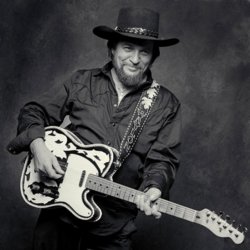Waylon Jennings
- Birth name: Waylon Arnold Jennings
- Born: 1937-06-15
 Littlefield, Texas, United States
Littlefield, Texas, United States- Died: 2002-02-13
 Chandler, Arizona, United States
Chandler, Arizona, United States- Genre: Country
- Years active: 1958-2000
- Website: waylonjennings.com
- Average rating: not rated yet
Users contributing to this page: JanMalysiak
Biography
Waylon Arnold Jennings (pronounced /ˈweɪlən ˈdʒɛnɪŋz/; June 15, 1937 – February 13, 2002) was an American singer, songwriter, and musician. In 1958, Buddy Holly arranged Jennings's first recording session, and hired him to play bass. Jennings gave up his seat on the ill-fated flight in 1959 that crashed and killed Holly, J. P. "The Big Bopper" Richardson and Ritchie Valens. During the 1970s, Jennings was instrumental in the inception of Outlaw country movement, and recorded country music's first platinum album, Wanted! The Outlaws with Willie Nelson, Tompall Glaser, and Jessi Colter.
Jennings began playing guitar at eight and began performing at 12 on KVOW radio, after which he formed his first band, The Texas Longhorns. Jennings left high school at 16, determined to become a musician, and bounced around as a performer and DJ on KVOW, KDAV, KYTI, KLLL, in Coolidge, Arizona, and Phoenix. He formed a rockabilly club band, The Waylors, and enjoyed a residency at "JD's", a club in Scottsdale Arizona. He recorded for independent label Trend Records and A&M Records, but did not achieve success until moving to RCA Victor, taking on Neil Reshen as a manager, who negotiated significantly better touring and recording contracts for him.
After finally wresting creative control from RCA Victor, his career turning point became the critically acclaimed albums Lonesome, On'ry and Mean and Honky Tonk Heroes followed by hit albums Dreaming My Dreams as well as Are You Ready for the Country. 1976's platinum-certified Wanted! The Outlaws was followed by Ol' Waylon and the hit song "Luckenbach, Texas".
Jennings was featured in the 1978 album White Mansions performed by various artists documenting the lives of people in the Confederacy during the Civil War. The songs on the album were written by Paul Kennerley. Jennings also appeared in films and television series, including Sesame Street, and a stint as the balladeer for The Dukes of Hazzard, composing and singing the show's theme song and providing narration for the show.
By the early 1980s, Jennings was struggling with a cocaine addiction, which he overcame in 1984. Later, he joined the country supergroup The Highwaymen with Willie Nelson, Kris Kristofferson, and Johnny Cash, which released three albums between 1985 and 1995. During that period, Jennings released the successful album Will the Wolf Survive.
He toured less after 1997 to spend more time with his family. Between 1999 and 2001, his appearances were limited by health problems. In 2001, he was inducted into the Country Music Hall of Fame, which he chose not to attend. On February 13, 2002, Jennings died from complications of diabetes. In 2007, he was posthumously awarded the Cliffie Stone Pioneer Award by the Academy of Country Music.
Albums:
Comments:
Log in to leave a comment.


